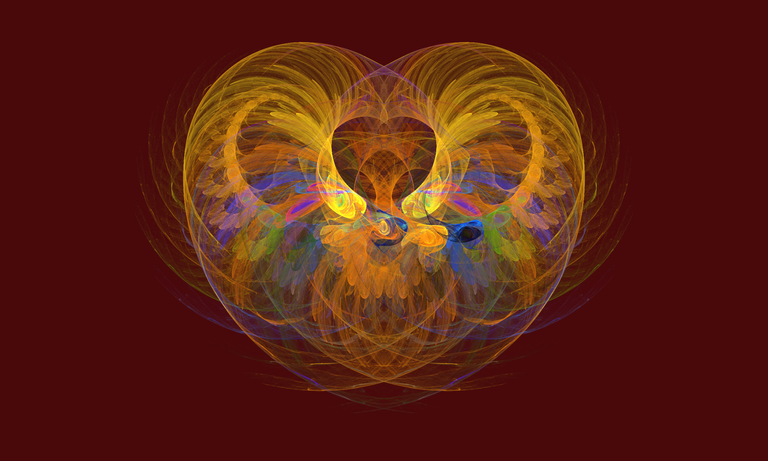One pure fractal made in Apophysis 2.09, mirrored and rotated upon itself

If I were in a grumpier mood about my career as a captain, I would have called this story “Things You Hate to Hear, Followed By Things You Hate to See!”
“It is a great blessing that you are in this neck of the parsec helping out the Ghizizelli, and since we are just as important in terms of the consortium's being able to come through here freely, we know you will be delighted, Captain, in helping us retrieve the living wedding gift we are making to a important member of the Ghizizelli Planetary Republic.”
It was indeed some wedding gift … even in human terms, the gift resembled all the flutters of the heart, and all the lightness, and all the glories of light and love one hoped a married couple would feel on their day of wedded bliss. It was a kind of bird in Thuliuvarian terms, and its shimmering flight would surely thrill the heart of the newlyweds, and their children, and probably their grandchildren given the longevity of these beautiful creatures.
This was the part, though, that gave experienced captains a touch of heart palpitations.
“We have the coordinates – the homing beacon is working fine and the bird is still safely in stasis. We just can't get to it in our vessels.”
To understand why this was disturbing, you have to understand the state of starship design in the galaxy at that point in the 23rd century – really in any century of space travel in any civilization. All true starships, everywhere, are marvels of science – the forces they have to resist and replicate to make the life of their pilots possible far beyond the influences of their own planets and suns are tremendous. The computational and navigational abilities of any such vehicle are magnificent, and the shielding even on small shuttles and freighters is stout just given what stars themselves daily put out in terms of radiation.
All that is to say that if you truly do need the abilities of a fleet starship, Constitution-class, to solve your problem retrieving an item, you have a problem indeed.
To also understand why this was disturbing, it is also necessary to talk about some math Earthlings live happily with everyday but cannot solve. Even the Vulcans and Uppaaimar, far superior in math and science, say there is no standard equation for what is called the “three-body problem” that can fit within mortal mind, so humanity need not feel bad.
What this basically means is for orbital systems that have three items or more in them, there is no general equation for how they will orbit each other. We can approximate how particular systems with particular item gravities should behave, but a miss is as good a light-year in practical terms. The stability of the Solar System is a marvel of Creation, given that the Sun and Jupiter together keep the millions of other planets, dwarf planets, comets, asteroids, and moons in an order that allows Earth to be unmolested by everything else. Most inhabited systems have similar setups or far fewer items in their local vicinity, because … well, star systems with lots of items can end up looking like this:
Another pure fractal made in Apophysis 2.09, overlaid upon itself

That's a red dwarf binary star system with lots and lots of things in it, and all of them orbiting each other's common centers of gravity at a particular moment in time – at least, for that day. The everlasting do-see-do dance of a system like this, with items switching orbits, is something that has to be approximated in situation by a fleet starship's computer, and that is why the Amanirenas got the call.
My first officer and also chief science officer Commander Helmut Allemande took one look at that thing on the screen and said to Ensign Pushkin at the navigational console, “You are relieved, Ensign.” The first officer sat down in his place and started re-calibrating the navigational computer.
“May I watch and learn, sir?” the younger officer said.
“By all means, Ensign,” Cmdr. Allemande said. “If this goes wrong, I just don't want you, the junior officer, to be held responsible for it.”
Meanwhile, both admirals on board met me for a conference, and the one related to me said, “Well, Captain, they got us going in circles, round and round … .”
Admiral Thomas Jefferson, friend to my uncle, Admiral Benjamin Banneker, cracked up laughing.
“You know,” I said, “Aunt Almira is a terrible influence on you, Uncle Benjamin.”
Both of the admirals were in their eighties; to them, this might as well have been a walk in the park. The briefing was a courtesy briefing: there was no doubt that we would get it done and maintain good relations with the civilizations that were our consortium's neighbors, and perhaps even influence them to join by our skilled handling of these affairs. The challenge was just having a ship powerful enough in computing to be able to manage the approximations necessary without blowing out the whole system, and they knew the Amanirenas and her crew could do it.
Even Cmdr. Allemande knew it was not a huge problem once the advanced math was keyed in, and of course he knew that the distances between items bigger than our navigational and shielding systems could handle was vast – plenty of reaction time at sub-light speed. But he also knew that Ens. Pushkin did not have the experience to know what to do in the time it had to be done in … by the time we got the call, the wedding was three hours away at safe cruising warp speed, and on schedule to happen in six hours.
We retrieved the capsule in two hours and delivered it with an hour to spare to the Thuliuvarians, who then made it to the wedding on time and talked with our new Ghizizelli friends about how wonderful we were in the consortium … goodwill expanded.
“Yeah, but, how come other people always get the heart flutters and we always get the palpitations?” Ens. Pushkin said.
“Perks of the job,” Cmdr. Allemande said. “Birds and lovers flutter. Fleet officers get the job done, no matter what.”
“Right, Commander, right – we have to remember who we are, and that we're built for this,” the ensign said.
Helmut Allemande today is a captain up for promotion to commodore, and Gyorgy Pushkin is a lieutenant commander being considered for a commander's position. This was the day that the younger officer understood the nature of the journey – which is why I am not grumpy about my career as a captain. I enjoyed all the perks of the job, including my crew developing before my eyes into leaders this fleet is proud of.
